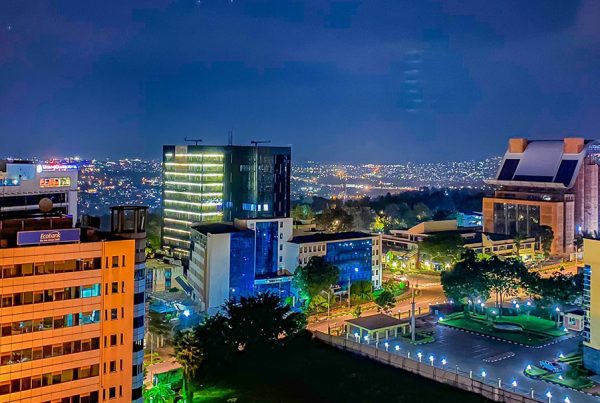MTN Rwandacell Plc expects its mobile money and data businesses to drive mid-teen service revenue growth this year as the company tightens capital allocation and reaps gains from a sweeping cost efficiency program, Chief Financial Officer Dunstan Ayodele Stober said in an interview.
First-half revenue rose 13.7 percent from a year earlier, powered by a 29.1 percent jump in fintech income and a 9.1 percent increase in data revenue, offsetting a 5 percent drop in voice.
The growth reflects an expanding Momo merchant base, rising active user penetration, and continued smartphone adoption. Data gains are underpinned by higher smartphone penetration, which climbed 41.5 percent, and increased consumption volumes.
“Fintech and data will continue to be the key levers that deliver growth for us,” Stober said, adding that advanced services such as international remittances and bank-tech products grew 41 percent in the first half as the company diversifies beyond traditional send-and-receive transactions.
Cost of sales fell 27 percent after the company cut interconnect expenses, shifted away from device subsidies, and optimized delivery models for affordable smartphones. Last year’s Rwf4 billion device subsidy has been replaced with partnerships and financing models, helping to sustain handset uptake while containing costs.
Operating expenses rose 17 percent on a reported basis due to a lease accounting adjustment, but grew only 8.3 percent on a normalized basis, well below revenue growth, as MTN delivered 7 billion francs in savings from a targeted Rwf15 billion pipeline for the year. “The strong delivery of profitability comes from revenue uplift and the containment of cost of sales, interconnect and device cost,” Stober said.
The launch of 5G services this year marked a strategic shift in capital deployment. Despite the network upgrade, capital expenditure is running below last year’s levels as MTN applies stricter investment discipline, prioritizing projects with the highest return potential. “Our focus this year is to invest smartly in areas that will deliver growth,” Stober said. “We did not do 5G last year. We did it this year, but we have managed to spend less than we did last year.”
Looking ahead to the second half, Stober expects stronger momentum driven by continued fintech expansion, rising data adoption, and disciplined spending. Key priorities include sustaining market share gains, growing the subscriber base, accelerating migration from 3G to 4G, and further increasing smartphone penetration through new affordability models. MTN will also channel value-based capital allocation into network modernization and targeted capacity expansion to support profitability.
For the full year, MTN Rwanda maintains its earlier outlook of mid-teen service revenue growth, with fintech revenue projected to climb more than 20 percent. The company is targeting an EBITDA margin of 40 percent to 42 percent and aims to keep capital expenditure intensity between 15 percent and 18 percent. “We will continue to evaluate investments in terms of the returns that will deliver sustainable growth for us,” Stober said.
The forward strategy hinges on deepening the mobile money ecosystem, expanding high-value digital services, and monetizing data consumption as Rwanda’s smartphone base grows. Stober sees these trends positioning MTN Rwanda to maintain double-digit top-line growth in the medium term while keeping costs in check, a balancing act he says will define the company’s performance in the years ahead.





